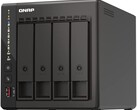There are literally thousands of Docker containers for almost every application whether it’s running a Minecraft server, Plex, Torrent box or video encoder. The advantage of Docker is that each application is containerised, so if a container (however unlikely) gets compromised, the others remain unaffected. Equally, only the minimum amount of resources for running the application are installed making it very efficient and therefore great for low end, low power draw hardware.
If you want to get started with Docker, here are 3 containers that will run simultaneously on anything, including a Raspberry Pi (available on Amazon*).
WireGuard Easy
So named because of its ease of setup, WireGuard is a VPN that will let you connect to your home network from anywhere. As is the case with most Docker containers, you get a web interface to access the service and from there you can enable access for the devices you want to connect while away from home. There are WireGuard apps for all the major operating systems, whether mobile or PC, and connecting to your home network is as easy as scanning the QR code from the web interface of the container. All you need to do is make sure that you forward port 51820 (the default WireGuard port) through your router. You not only get the benefits of a VPN, but only expose a single port to the internet instead of multiple ports if you use a range of different services.
AdGuard Home
AdGuard Home is a network wide adblock similar to PiHole. Where AdGuard really shines is with its relatively easy to configure interface and the fact that it has built in parental control features. If you have younger kids in the house you can severely restrict access to adult content and also enforce safe search across a number of search engines. Similarly, if you have less savvy users that insist on visiting sites infected with malware, the AdGuard browsing security service will notify the user and block access to the site. AdGuard offers decent network wide blocking out of the box with little to no in depth configuration required. Turn on what you want, set your router's default DNS as the AdGuard IP and you are good to go. Just make sure you support your favourite sites by whitelisting them.
Vaultwarden
Vaultwarden is an unofficial Bitwarden server and is compatible with Bitwarden clients. Essentially it is a password manager that can work across almost any device without relying on a company to host this service for you. The advantage over Bitwarden is that it uses significantly fewer resources and is compatible with ARM architecture, meaning you can use it on a Raspberry Pi. You can share passwords among registered users as well as store attachments and files. The service can be secured with two factor authentication using either email, DUO, Yubikey or FIDO2 and can be made public facing through the use of a reverse proxy, or keep it behind your router and use WireGuard to access it when away from home.
While these represent only a few of the docker containers available for lower resource devices, if hardware limitations aren’t an issue you might consider running a Plex or Jellyfin server so you can stream your media from anywhere, host your own Image backup with Immich, or transcode your media library with tdarr so it takes up significantly less space. The possibilities with Docker are almost endless.














